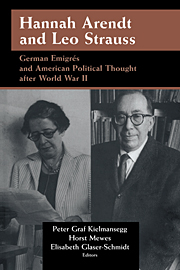Book contents
- Frontmatter
- Introduction
- PART I HANNAH ARENDT
- PART II LEO STRAUSS
- 4 Reflections on Leo Strauss and American Education
- 5 Leo Strauss: The Quest for Truth in Times of Perplexity
- 6 Leo Strauss and Martin Heidegger: Greek Antiquity and the Meaning of Modernity
- 7 Leo Strauss: German Origin and American Impact
- 8 The Modern World of Leo Strauss
- PART III ROUNDTABLE DISCUSSION
- Select Bibliography of Works by Arendt and by Strauss on Modern Political Science and Philosophy
- Index
6 - Leo Strauss and Martin Heidegger: Greek Antiquity and the Meaning of Modernity
Published online by Cambridge University Press: 05 January 2013
- Frontmatter
- Introduction
- PART I HANNAH ARENDT
- PART II LEO STRAUSS
- 4 Reflections on Leo Strauss and American Education
- 5 Leo Strauss: The Quest for Truth in Times of Perplexity
- 6 Leo Strauss and Martin Heidegger: Greek Antiquity and the Meaning of Modernity
- 7 Leo Strauss: German Origin and American Impact
- 8 The Modern World of Leo Strauss
- PART III ROUNDTABLE DISCUSSION
- Select Bibliography of Works by Arendt and by Strauss on Modern Political Science and Philosophy
- Index
Summary
At one point in his life, Leo Strauss felt compelled to take an “explicit” stand toward Martin Heidegger. The reasons were a mixture of the personal and the philosophical: As a young university student, Strauss was deeply impressed by Heidegger's “seriousness, profundity, and concentration in the interpretation of philosophic texts.” There “had been no such phenomenon in the world since Hegel.” Strauss gradually became aware of the “breath of the revolution of thought” prepared by Heidegger. Moreover, he came to sympathize with crucial facets of that revolution. Increasingly, Strauss also thought in terms of a “crisis of the West,” rather than subscribing to the pervasive belief in Western progress and enlightenment. Like Heidegger, Strauss recognized the self-destructive nature of modern rationality and the philosophical limits of modern natural science. And like Heidegger, he returned to Greek antiquity to gain the vantage point from which to properly comprehend the essence of modernity.
It is in their respective understandings or interpretations of Greek philosophy, however, that the profound divergence between Strauss and Heidegger most clearly emerges. To put their differences in a nutshell: Strauss's lifework consisted of a “return to classical political philosophy” (emphasis added), that was both “necessary and tentative or experimental.”
- Type
- Chapter
- Information
- Hannah Arendt and Leo StraussGerman Émigrés and American Political Thought after World War II, pp. 105 - 120Publisher: Cambridge University PressPrint publication year: 1995
- 4
- Cited by

